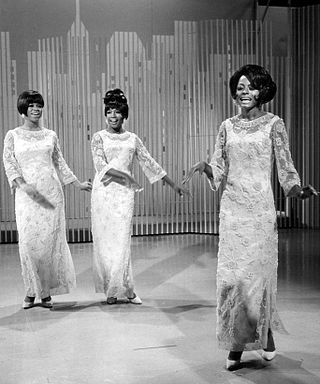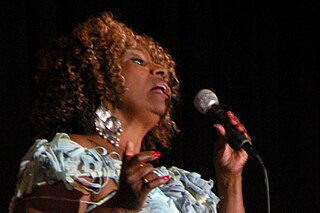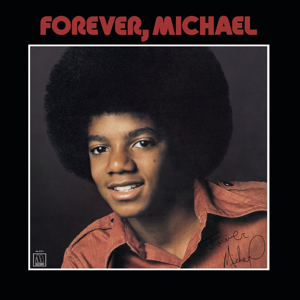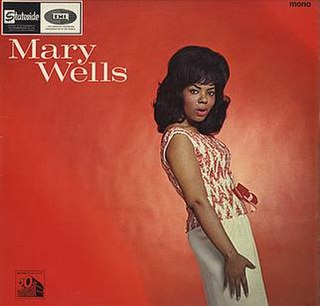
The Supremes were an American girl group and a premier act of Motown Records during the 1960s. Founded as the Primettes in Detroit, Michigan, in 1959, the Supremes were the most commercially successful of Motown's acts and the most successful American vocal band, with 12 number-one singles on the Billboard Hot 100. Most of these hits were written and produced by Motown's main songwriting and production team, Holland–Dozier–Holland. It is said that their breakthrough made it possible for future African-American R&B and soul musicians to find mainstream success. Billboard ranked the Supremes as the 16th greatest Hot 100 artist of all time.

William "Smokey" Robinson Jr. is an American R&B and soul singer, songwriter, record producer, and former record executive. He was the founder and frontman of the pioneering Motown vocal group the Miracles, for which he was also chief songwriter and producer. He led the group from its 1955 origins, when they were called The Five Chimes, until 1972, when he retired from the group to focus on his role as Motown Records vice president. Robinson returned to the music industry as a solo artist the following year. He left Motown in 1999.
Motown is an American record label owned by the Universal Music Group. It was founded by Berry Gordy Jr. as Tamla Records on January 12, 1959, and incorporated as Motown Record Corporation on April 14, 1960. Its name, a portmanteau of motor and town, has become a nickname for Detroit, where the label was originally headquartered.

Lamont Herbert Dozier was an American singer, songwriter, and record producer from Detroit. He co-wrote and produced 14 US Billboard number-one hits and four number ones in the UK.

Mary Esther Wells was an American singer, who helped to define the emerging sound of Motown in the early 1960s.

Syreeta Wright, who recorded professionally under the mononym Syreeta, was an American singer-songwriter, best known for her music during the early 1970s through the early 1980s. Wright's career heights were songs in collaboration with her ex-husband Stevie Wonder and musical artist Billy Preston.
"Someday We'll Be Together" is a song written by Johnny Bristol, Jackey Beavers, and Harvey Fuqua. It was the last of twelve American number-one pop singles for Diana Ross & the Supremes on the Motown label. Although it was released as the final Supremes song featuring Diana Ross, who left the group for a solo career in January 1970, it was recorded as Ross' first solo single and Supremes members Mary Wilson and Cindy Birdsong do not sing on the recording. Both appear on the B-side, "He's My Sunny Boy".

"Stoned Love" is a 1970 hit single recorded by The Supremes for the Motown label. It was the last Billboard Pop Top Ten hit for the group, peaking at number seven, and their last Billboard number-one R&B hit as well, although the trio continued to score top ten hits in the UK into 1972. In the UK, it was the post-Ross Supremes' biggest hit, reaching number 3 in the singles chart. The single spent six weeks in the UK top ten and five weeks in the US top ten. The BBC ranked "Stoned Love" at number 99 on The Top 100 Digital Motown Chart, which ranks Motown releases solely on their all time UK downloads and streams.

Brenda Holloway is an American soul singer who was a recording artist for Motown Records during the 1960s. Her best-known recordings are the hits "Every Little Bit Hurts", "When I'm Gone", and "You've Made Me So Very Happy". The latter, which she co-wrote, was later widely popularized when it became a Top Ten hit for Blood, Sweat & Tears. She left Motown after four years, at the age of 22, and largely retired from the music industry until the 1990s, after her recordings had become popular on the British "Northern soul" scene.

Forever, Michael is the fourth studio album by American singer Michael Jackson, released by Motown Records on January 16, 1975. The album is credited as having songs with funk and soul material. Eddie Holland, Brian Holland, Hal Davis, Freddie Perren, and Sam Brown III served as producers on Forever, Michael. It is the final album before Jackson's solo breakthrough with his next album, Off the Wall (1979) and has sold 1 million copies worldwide.

Live at the London Palladium is a live double album by soul musician Marvin Gaye, released March 15, 1977, on Tamla Records. Recording sessions took place live at several concerts at the London Palladium in London, England, in October 1976, with the exception of the hit single "Got to Give It Up", which was recorded at Gaye's Los Angeles studio Marvin's Room on January 31, 1977. Live at the London Palladium features intimate performances by Gaye of many of his career highlights, including early hits for Motown and recent material from his previous three studio albums. As with his previous live album, Marvin Gaye Live!, production of the record was handled entirely by Gaye, except for the studio portion, "Got to Give It Up", which was managed by Art Stewart.

More Hits by The Supremes is the sixth studio album by Motown singing group the Supremes, released in 1965. The album includes two number-one hits: "Stop! In the Name of Love" and "Back in My Arms Again", as well as the Top 20 single "Nothing but Heartaches".

Marvin Earl Johnson was an American R&B singer, songwriter and pianist. He was influential in the development of the Motown style of music, primarily for the song "Come to Me," which was the first record issued by Tamla Records, the precursor to the famous label.

"Forever Came Today" is a 1968 song written and produced by the Motown collective of Holland–Dozier–Holland, and was first made into a hit as a single for Diana Ross & the Supremes in early 1968. A disco version of the song was released as a single seven years later by Motown group the Jackson 5.

Mary Wells is the self-titled sixth studio album released by Mary Wells. The album was her first album with 20th Century Fox, a year after she left her old label, Motown, the label that she had produced its first hits with. While this album was boosted by the top 40 success of the Motown-esque "Use Your Head", the album received little notice and its following singles including the top 50 hit, "Ain't It the Truth?" and "Stop Taking Me for Granted", which peaked at a dismal number 88 pop, performed poorer for an artist who a year ago had scored her first No. 1 hit with "My Guy". This and Love Songs to the Beatles were the only albums she released with 20th Century Fox.
"Dear Lover" is a song produced by respected Chicago producer Carl Davis, and written by Davis, along with Gerald Sims It was released as a single by R&B singer Mary Wells, released off her album, The Two Sides of Mary Wells, on the Atco label. Davis was working for the OKeh imprint of Columbia Records at the time, and was moonlighting to record Mary Wells, whom he was dating. The upshot, was he was fired from OKeh.

"Whisper You Love Me Boy" is a song written and composed by Holland–Dozier–Holland and recorded by at least three Motown female acts: early Motown star Mary Wells, popular Motown singing group The Supremes and blue-eyed soul Motown label mate Chris Clark in 1964, 1965 and 1967 respectively.

Longplay Album – Volume II is the second album by the Dutch soundalike studio group Stars on 45, released on the CNR Records label in the Netherlands in August 1981. In the US the album was retitled Stars On Long Play II, released on Radio Records and credited to 'Stars On'. In the UK, Ireland, Australia and New Zealand the album was listed as Stars on 45 Volume 2 or Stars on 45 – The Album – Volume 2, credited to Starsound and issued on CBS Records. Just like the first Stars on 45 album Longplay Album – Volume II was also officially released in the Eastern Bloc by state-owned czechoslovak label Opus, credited to Stars On 45 but under the title Stars on 45 – Volume II.

Give It Away is the debut album by American soul group The Chi-Lites, produced by Carl Davis and lead singer Eugene Record. The album was released in 1969 on the Brunswick label.

"Where Did Our Love Go" is a 1964 song recorded by American music group the Supremes for the Motown label.

















